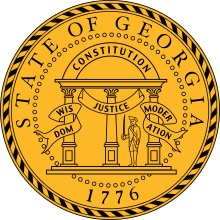Archibald Bulloch
| Archibald Bulloch | |
|---|---|
 Archibald Bulloch c. 1775 | |
| 3rd Governor of Georgia | |
|
In office April 15, 1776 – March 4, 1777 | |
| Preceded by | William Ewen |
| Succeeded by | Button Gwinnett |
| Personal details | |
| Born |
c. 1730 Charleston, South Carolina |
| Died |
February 22, 1777 (aged 46–47) Savannah, Georgia |
| Political party | Liberty Party |
| Spouse(s) | Mary De Veaux |
| Profession | lawyer, statesman |
Archibald Bulloch (January 1, 1730 – February 22, 1777) was a lawyer, soldier, and statesman from Georgia during the American Revolution. He was also the great-grandfather of Martha Bulloch Roosevelt, and the great-great-grandfather of Theodore Roosevelt the 26th President of the United States.[1]
Early life
Bulloch was born and educated in Charleston, South Carolina, the son of James Bulloch and Jean Stobo Bulloch. He began to practice law in South Carolina and was commissioned as a lieutenant in the South Carolina militia. His family moved to Georgia in 1758, and Bulloch moved to Savannah, Georgia, in 1764. He was elected to the Commons House of Assembly of Georgia in 1768.
Revolution
Bulloch served as President of the 1st and 2nd Provincial Congresses of Georgia, and was a delegate in 1775 to the Continental Congress. There, he won John Adams's praise for his "Abilities and Fortitude". In the Continental Congress, he was a member of the Secret Committee, which was responsible for gathering war supplies. Bulloch is also recorded as having been a Freemason in Georgia. His name is listed on the 1779 Masonic rolls of Solomon's Lodge No. 1 at Savannah along with George Walton, John Adam Treutlen, James Jackson, Nathaniel Pendelton, and General Samuel Elbert.
Bulloch would have been a signer of the Declaration of Independence, but decided to return to Georgia to aid the revolution there. In 1776, he fought under the command of Colonel Lachlan McIntosh in the Battle of the Rice Boats and the Battle of Tybee Island. On June 20, 1776, he was chosen to be the first President and Commander-in-Chief of Georgia under the state's temporary republican government. When he signed the state constitution on February 20, 1777, his position transferred from president to governor of Georgia. He was thus Georgia's first chief executive under a proper constitutional government, but the third chief executive in all, following the brief tenures of presidents William Ewen and George Walton.
Bulloch died in Savannah while preparing to defend against the British invasion of Georgia in 1777. There is some speculation that he was poisoned, though this has never been proven. His death was a severe blow, as his was the only leadership that united the Whig factions in the troubled young state. He is buried in Savannah's Colonial Park Cemetery.
Legacy
His son William Bellinger Bulloch later represented Georgia in the United States Senate. Archibald's great-great-grandson was President Theodore Roosevelt. His great-great-great granddaughter was First Lady of the United States Eleanor Roosevelt. Theodore Roosevelt's son Archibald was named after his ancestor.
Bulloch County, Georgia, was named in his honor.
References
- ↑ Jim Schmidt (2002-09-19). "Archibald Bulloch (1730-1777)". New Georgia Encyclopedia. Retrieved 2013-10-10.
External links
- Archibald Bulloch at the Biographical Directory of the United States Congress
- Article in New Georgia Encyclopedia
| Political offices | ||
|---|---|---|
| Preceded by William Ewen (President of Council of Safety) |
Governor of Georgia 1776–1777 |
Succeeded by Button Gwinnett |
| ||||||||||||||||
